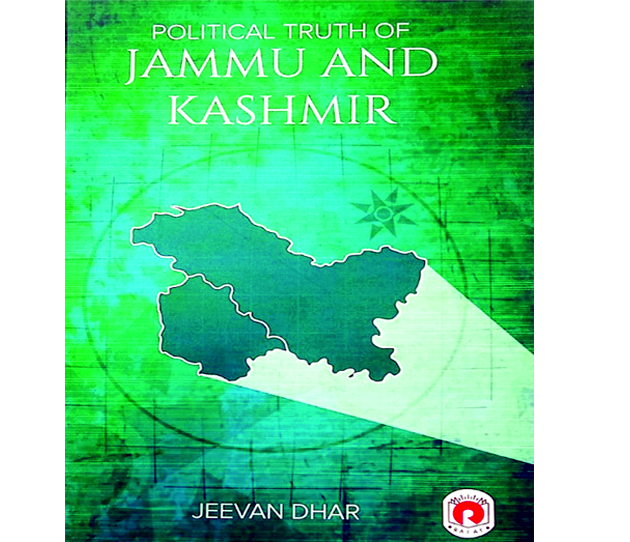Sanjeev K. Sharma
Book: Political Truth of Jammu and Kashmir
Author: Dr. Jeevan Dhar
Publisher: Rajat Publications, New Delhi
Price: Rs. 1495
Availability: With prominent book dealers of Jammu
The book ‘Political Truth of Jammu and Kashmir’, the first edition of which has been released recently, narrates and analyses boisterous events in J&K and gives subsequent historical developments in the newly created Union Territory.
This book is the portrayal of harsh political realities of J&K and indicates how the political truth of the State was actualized by Prime Minister, Narendra Modi and how the ingredients like Article 370 and 35-A were brought to surface and the ingrained truth of his leadership made him assume the role of new helmsman who could propel the boat of India’s destiny towards a safe, secure and scintillating shore despite the reckless behaviour of a sizable section of the commuters on-board.
The book assesses the hope for emergence of a political order which regenerates the noblest strands and sinews of India’s cultural heritage of service to man as service to God and provides avenue for achieving good of an enlightened J&K.
The 221 page book, which the author has dedicated to the people of Dachhan, is divided into five parts (chapters).
In first chapter ‘Political Development of Jammu and Kashmir (Ancient to Modern Period)’ of the book, the author gave a detailed mention of ancient political history of Jammu using historical accounts available at present.
The book claims that Jammu region was part of Madra kingdom during early Rigvedic period and Madra extended from Satluj River to Indus River.
Under head ‘Jammu after Mahabharta Era’, the author writes that Jyoti Prakash and Sarva Prakash both decendents of king Shiv Prakash of Mahabharta era re-captured Jammu with the assistance of Charak clan and established their rule.
Then he mentions about the Dogra dynasty (1703-1952) and also makes a mention of accession of Jammu and Kashmir to the newly independent Indian Union in 1947 during the reign of the last Dogra ruler, Maharaja Hari Singh.
In Lesson-2 of the book titled as ‘Accession and Aftermath’, Dr. Dhar mentions that following the rebellions in Poonch and Mirpur area and the Pakistan backed Pashtun tribal intervention from Waziristan and Khyber Pakhtunkhwa, the Maharaja asked for Indian military assistance but India set the condition that Kashmir must accede to India to receive the assistance. The Maharaja complied and the Government of India recognized the accession of the princely state to India.
In next chapter of the book titled as ‘Abrogation of Article 370 & 35A’ the author counts positive aspects of abrogation ranging from economic impact, education, security, administration and states that now the Central Government can effectively act against corruption paving the way for development of the region.
Chapter 4 of the book has been titled as ‘Elections and Dissolutions’ and it mentions events from constitution of Constituent Assembly to Assembly elections from 1957 to those of 2014.
The last chapter appears to be more important with the title ‘Emergence of New Political Order’. Here the author mentions about the political development in which the Jammu and Kashmir Reorganization Act 2019 was passed by the Parliament of India containing the provisions to reconstitute the State of J&K into two Union Territories-Jammu and Kashmir, and Ladakh which became effective on October 31, 2019. A bill for the Act was introduced by Union Home Minister, Amit Shah in Rajya Sabha on August 5, 2019 and it was passed on the same day. It was then passed by the Lok Sabha on August 6, 2019 and it received President’s assent on August 9, 2019.
In this particular chapter, the book also mentions about announcement of Scheduled Tribe status for Pahari Community of J&K by Union Home Minister, Amit Shah on October 4, 2022 at a rally in Rajouri. Pahari people are based in twin districts of Rajouri and Poonch in Jammu division and Baramulla and Kupwara districts of Kashmir division.
The author also mentions in his book that 14 months after the abrogation of special status of Jammu and Kashmir by the Parliament of India, the Union Home Ministry introduced first District Development Councils in J&K on October 16, 2020.
The book also mentions about the newly floated political outfit People’s Alliance for Gupkar Declaration formed after the abrogation of Article 370 to take on BJP.
The writer mentions that more political outfits that emerged in J&K after abrogation of special status from the erstwhile J&K State were Jammu and Kashmir Apni Party, Democratic Progressive Azad Party-floated by former J&K Chief Minister Ghulam Nabi Azad after deserting Congress etc.
Jammu based ‘Ikk Jutt Jammu’ party also got a mention in the book wherein the author stated that the Party was founded in November 2020 and is currently led by a prominent Advocate Ankur Sharma. The party wants to stop ‘Muslim separatism and Jihad war’ while the Delhi based Aam Aadmi Party led by Arvind Kejriwal also laid its feet in political arena of Jammu and Kashmir.
Criticism: The book lacks many aspects of J&K. It has no mention about the contributions of legendary warrior General Zorawer Singh who used the power of sword to bring Ladakh under Dogra rule after fighting wars in Tibet. It is hoped that the revised edition of the book may accommodate all such aspects of history.
About the author: Dr. Jeevan Dhar presently working as Associate Professor in Government Degree College Padder, district Kishtwar remained an outstanding student leader, social worker, college teacher and original thinker and a writer from Jammu and Kashmir.
Other books by the author: The Flow of Askini, Impact of Land Reforms on Politics of Jammu and Kashmir, Coalition Politics and Rainbow Governments in India and Terrorism and Politics in Jammu and Kashmir.


